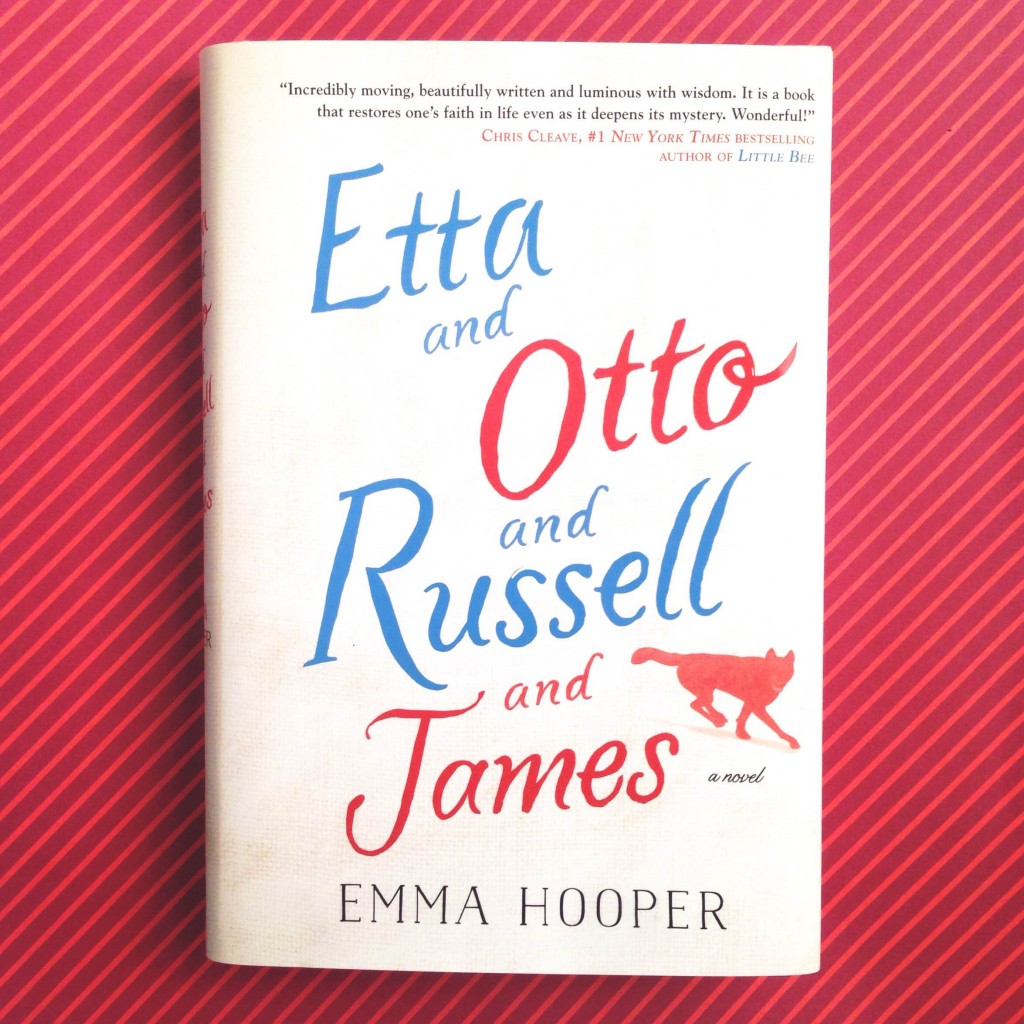Etta & Otto & Russell & James, by Emma Hooper. Hamish Hamilton, out now.
[I received this book from Penguin Canada in exchange for an honest review; this did not affect my opinion of the book whatsoever.]
Etta – now: elderly wife, early alzheimer’s, restless; then: young schoolteacher, in love with a former student, grieving her sister.
Otto – now: elderly husband, left alone to make paper mache animal sculptures; then: young soldier who learned how to write by sending letters to his former schoolteacher.
Russell – now: elderly bachelor, farmer, in love with Etta; then: school boy left at home due to a bungled leg, in love with Etta.
James – now: wolf who wanders with Etta; then: not yet in existence.
Etta & Otto & Russell & James was a beautiful, melancholy read of love, independence and character.
Told in chapters that alternate between the present and the past, we are brought into the world of a couple as they were together and apart. Etta wakes up one morning in the farmhouse she shares with Otto in Saskatchewan and decides she needs to walk to the East Coast. She leaves with a note in her pocket of who she is and who her family is, besides food and a rifle. Otto, her husband, must learn how to be on his own for the first time, and even though she left a note saying I will try to remember to come back, he’s not worried about her. He knows she will be okay. Russell, like a brother to Otto since they were children, lives on the neighbouring farm. He decides to go after Etta. James, the wolf, encounters Etta on her journey as a guide.
Etta & Otto & Russell & James was a slight out-of-my-comfort zone read and I’m glad I read it. I’m not too used to reading contemporary CanLit book-clubby books (or, frankly, books that involve elderly people) but I really enjoyed the way Canadian landscape and history played a part in the narrative, and I found the World War II-era scenes and letters romantic, they were so delicate and hopeful. I also really liked Etta’s present-day narrative, describing how she navigates around people while on her trek. However, I did find the concept of an elderly woman walking from Saskatchewan to the East Coast (3,232 km) to be a bit of a stretch. I found Russell to be a bit of a waste of a character, and James to be that random sad, mystical input. What really helps make the story lovely and poetic is Hooper’s writing, but I’m unsure of the kind of purpose of leaving out quotation marks. What am I missing?
But overall, I had such a good time reading this book that I forgot to highlight or mark notes, knowing I would review it. The pages flowed into one another, and I would think about the book when not reading it. The book has that kind of essence you find in indie movies (for example, anything Wes Anderson), where all the characters come across as a bit devoid of feelings while telling highly emotional stories. Etta & Otto & Russell & James puts you in a weird trance, floating along with the story, but it still makes you try to fill in some gasps of air along the way.
She had been in Manitoba for three days, three dry days, when Etta’s boots started leaking. Not letting liquid in, but letting it out, leaving a rust-coloured trail behind her. In the morning it was just a mist of fine dots, hardly distinguishable by sight, only slightly more noticeable by scent, for those that notice scent. But by noon the dots had become a constant, if thing, trickle: the trail of them conjoining into two fine lines, like spider silk pulling from Etta’s feet. And by midafternoon the trail-lines had spread into tracks like a burgundy cross-country ski path. The scent, for those that live by scent, was overwhelming. At six o’clock in the evening, Etta noticed that her feet hurt. These are good boots, she whispered to nobody, to Manitoba, these are very good boots. But her feet hurt. And the boots were leaking, and she was starting to feel faint. Damn, she said. Etta didn’t think there was any part of herself stronger than her boots. If her boots broke, anything could.

